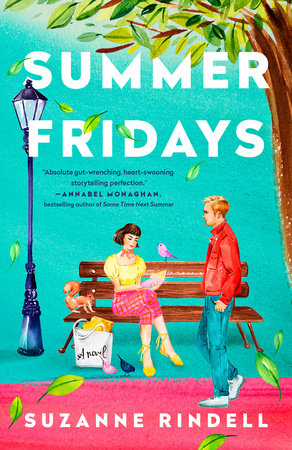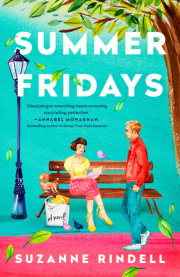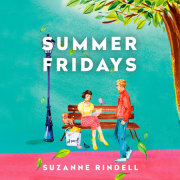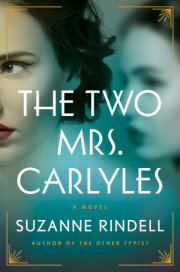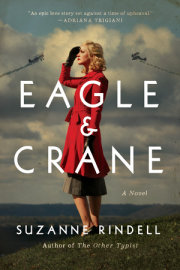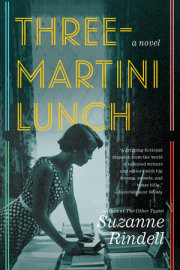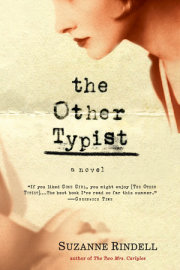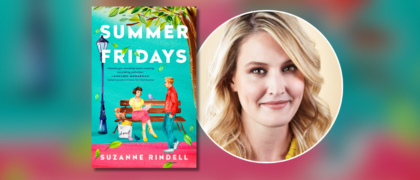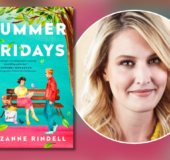1.
When her eyes catch on the little clock on the far wall beyond her desk, she realizes it's already ten past noon.
She gets a sudden urge: she wants to take her bag lunch outside and eat it in the park. This seems wrong, to a certain extent-but then, everything seems wrong lately. Every time she scans the newspaper headlines or opens her email, she reads of another event canceled. It seems that no one feels right doing anything but staying home and feeling not right.
She glances at the clock again, and makes up her mind. She wants to be reminded of things that are simple: Trees. Sky. Birds. Squirrels. Bench. The way the park path bends around a big brownish-gray boulder. Things that haven't changed, in a time when it feels like everything will never be the same.
From her office, it is a short walk to the southwest corner of Central Park. There are fewer people out than there would normally be in mid-September. No drummer guy merrily tapping away on his plastic buckets, no flower guy with the blue roses, ink stains on his fingers. But there are still a couple of snack vendors hunched over the stainless steel carts that are their livelihood, looking guilty for selling hot dogs. A handful of people dressed in office attire, clutching giant pretzels and cans of diet soda. Even a few joggers intent on a return to normalcy.
She walks a little bit of the way into the park-just to the bend in the path she was longing to see-and finds a bench in the shade.
People pass by. A middle-aged woman pushing a stroller. A man walking a golden retriever with reddish-tinged fur. An off-duty doorman smoking a cigarette, sweating under his heavy uniform.
After a while, two girls come along and settle into the opposite end of the bench, a polite distance away from her. She takes out a book and pretends to read it, between bites of her lunch. Potato salad that she made herself-extra dill. She eats the salad out of a Tupperware bowl with a plastic spork from the office kitchen.
She listens to the girls talk. They are young. She is young, too-probably only a few years older than them-but somehow they are youthful in a way that makes her feel already slightly invisible.
So, just like that, he's back in touch? one of them asks the other.
Yes, the first girl replies. He wrote a long email. I got it that night. It was really sincere, actually.
He said the attacks made him think of you?
Well, yeah, I mean-in a roundabout way. He said it just put things in perspective. Made him think about what's important.
Ah. So: you, the friend says in an approving voice.
I guess so, the girl replies.
Will you get back together?
I don't know, the girl says. We might.
Hmm, the friend says.
After a pause, the girl adds, The thing is . . . I was thinking of him, too, when it happened. I know his office isn't downtown and there shouldn't be any reason he would have been in the area, but I still just . . . found myself thinking of him. Wanting to know he was OK. And wanting to talk to him again, I guess.
I guess it says something if you were both thinking of each other, the friend says.
Yeah, the girl agrees. We'll see. I'm meeting him tonight for a drink.
The friend giggles.
The girl doesn't laugh. She gives a furtive, self-conscious glance across the bench. I kinda feel like a jerk, talking about my love life right now, she confesses to her friend. You know . . . with everything else going on in the city . . . in the world.
Nah. What the hell else are we going to talk about? her friend points out. The rest is too depressing.
• • •
Eventually, the girls get up and walk on, leaving her alone on the bench again. The potato salad is all gone and she isn’t pretending to read a book anymore. A glance at her watch tells her she ought to be heading back to her office.
On her walk back, she gets to thinking. She's overheard the same thing a few times now-it's in the air. People getting back in touch with old friends, old acquaintances, and old flames. Are you OK? they ask each other. I was thinking of you. I hope you're OK. I wanted to hear your voice.
At her desk, she replies to a few work emails, forwarding an early review of a novel to the book's author and cc'ing her boss, then responding to the marketing department, mostly to agree with the marketing director about which bits from the review make for the best pull quotes.
Then she sits for a moment, staring vacantly into the even, bluish-white glow of the computer screen, lost in thought again.
After a moment, she clicks on Internet Explorer and brings up the web portal for her personal email. She logs in, and clicks on the envelope icon to start a new email message. She doesn't type in the address, not yet. She clicks on the body of the email. Start there, she thinks.
The blank message glows brilliantly white and empty, its cursor blinking like a character tapping their foot in a cartoon.
She stares for a long time. Minutes pass. She isn't sure how many. The message remains empty. The cursor blinks in place, having never moved.
Finally, she closes the blank message, then the browser window altogether.
New York City
1999
2.
Friday, May 28
The first surprise of the evening came when Charles didn't have an opinion about her dress.
Sawyer knew that plenty of men didn't have opinions about what their girlfriends wore, but Charles was not one of those men. He liked nice things. He respected style and admired design. Granted, he possessed a much wider array of in-depth opinions about men's fashion than he did about women's fashion-but either way, he had opinions.
Although Sawyer didn't necessarily agree with all of Charles's opinions, she appreciated that he always had one. A year earlier, when Charles first started as a junior associate at Wexler Gibbons, he'd been acutely sensitive to the fact that landing a spot at the prestigious corporate law firm had been like winning the lottery, and he'd wanted badly to make a good impression. He'd had plenty to say about what they both wore to company events. They'd made a ritual of it: Sawyer tried on the various possibilities and emerged from the bedroom in the back of their apartment to show him. Charles waited for her to ask what he thought, then proceeded to give her the carefully considered input of a true friend. Sawyer was grateful. Living in New York in your twenties meant trying to make your way in a mind-bogglingly expensive city while simultaneously paying off student loans. Looking the part on a budget required strategy, and having a huddle with your other half made it more fun.
So, when Sawyer pulled out the two dresses she was considering from their closet and held the hangers aloft to show Charles, she was thrown off to hear him say (after barely glancing at the dresses), "They both look nice."
She tried one on. Then, the other.
"Sure. Whichever you like; they both look great."
It was like a cliché scene in a movie: The husband's flat, comical indifference to his wife's appearance, the wife's alienated frown.
This isn't who we are, Sawyer's brain protested, with a hint of indignance. They'd gotten engaged less than a year ago; they were hardly an old married couple. Usually, getting dressed up for a night out was an occasion to flirt, a chance to hint that there might be sex later.
But having changed out of both dresses, Sawyer stood there in her underwear, frowning through the open bedroom door to where Charles sat in the other room. He didn't look up, not once. His attention was wholly trained on his company-issued laptop. The IBM ThinkPad was cracked open on the kitchen table, a heavy black clamshell with thuggish rectangular angles. Sawyer squinted, already knowing what she was likely to see-she could just barely make out a work-related legal document glowing on the screen.
She sighed and turned her attention back to the two discarded dresses now lying on top of the bed. One was powder blue, with cap sleeves. The other was black, with spaghetti straps that sat tautly on Sawyer's prominent collarbones. One was Jackie, the other was Marilyn. If Charles had actually looked at either dress when she'd tried them on for him, Sawyer knew he would have picked the Jackie.
Sawyer studied the two choices. Then, casting another frowning glance at Charles, she picked up the black dress with a hint of defiance and slipped it over her head. It had a slinky weight to it, and splashed down over the curves of her body like water. She took a moment to examine herself in the mirror, smoothing the fabric over her waist and hips and fiddling with the straps, wondering if she was actually brave enough to wear it.
The phone rang, its shrill cry seemingly able to snap Charles to attention when moments ago Sawyer had failed to coax more than a glance. He jumped up and grabbed the receiver from the kitchen wall.
"Hey-our car is downstairs," he said. "Ready?"
"Just need to slip on shoes, throw a few things into my bag. Is it cold out?"
"Nah. It's pretty much summer now. But who knows, bring a coat; it might get cold later."
• • •
Whenever they were invited to a company event, Charles insisted they skip the train, and not just take a cab, but splurge on a car service. Tonight, he’d used the one they usually reserved for picking up her parents at the airport, the one with the phone number that ended in all sixes-hopefully that wasn’t an omen of anything in particular.
The car smelled of air freshener; the drive downtown was quiet. Sawyer gazed out the window, hypnotized by the city streets whizzing by. And then they were there, squeezing between the narrow streets of the old Dutch version of New York and being dropped off at Cipriani, the neoclassical columns of the restaurant brilliantly bathed in a regal gold-and-purple-colored series of floodlights that seemed to have been selected especially for the evening.
They stepped out, climbed the stairs, and went inside.
It was immediately obvious: the whole place had been shut down, reconfigured, and was now decked out for the Wexler Gibbons corporate dinner. In fact, it was less like a "dinner" and more like a gala of some sort. A band played in one corner. Hors d'oeuvres circulated on silver trays. There were items up for bid via a silent auction, raising money for children's literacy. Campaign posters sporting blown-up photographs of adorable children holding books and pencils proudly announced that the firm gave millions annually to a well-known national foundation.
The building itself dripped with old-money intimidation: more neoclassical arches and columns, echoing marble, and an ornate, gold-laid coffered ceiling crowned with a Wedgwood dome at the center of it all.
"Wow," Sawyer said, immediately wishing that she'd opted for the powder-blue dress. They'd checked their coats. There was no going back now.
"I think we're over here," Charles said, steering Sawyer to one of countless tables wrapped with a white linen cloth tied with a purple satin bow. It was surrounded by a milling cluster of Wexler Gibbons's younger, ambitious-looking employees. Charles hovered, squinting at the place cards.
No one was sitting yet. After a moment, Sawyer became dimly aware that Charles merely wanted to verify his position in the room. And verify who would be sitting near him. Sawyer followed his gaze.
The place card next to his read "Kendra Larson."
• • •
The name “Kendra” put Sawyer in mind of a Ken doll-which was rather fitting, actually, because there was something Barbie-like about Kendra’s beauty that was simultaneously athletic and masculine. She was tanner and blonder than a New Yorker had any right to be, with broad shoulders and a strong jawline, and she carried herself like a beach volleyball player.
When Kendra took her place at the table next to Charles, she introduced her boyfriend. Sawyer caught the name over Charles's shoulder-Nick Something-or-Other-and once everyone had been introduced, Charles and Kendra turned toward each other and more or less didn't turn back for the rest of the night.
It was the second surprise of the evening. Charles knew that company dinners made Sawyer feel like a fish out of water, and he'd always been good about including her. When business talk left Sawyer on the outside, Charles worked a few of their stories as a couple into the conversation-usually a humorous anecdote that he and Sawyer could tell together. Conversation inevitably turned back to business, but by then at least Sawyer didn't feel faceless. After, Charles always tenderly kissed Sawyer's hand during the car ride home and thanked her for coming.
But that night, Sawyer found herself staring at the back of Charles's head and straining to hear. At one point, she made a feint to pivot and make new friends by engaging the man sitting to her left instead, but he was already deep in conversation and facing away from her, too. So her options boiled down to choosing between the backs of two heads: the unfamiliar cowlick versus the cowlick she knew. At least straining to hear her fiancé's conversation felt less like eavesdropping on strangers.
Or did it?
Charles and Kendra spoke with a surprisingly giddy intensity. They talked over each other like old friends and laughed at each other's jokes-a number of which were decidedly inside jokes, leaving Sawyer to smile blankly while waiting for their laughter to peter out. She was able to gather that they had been assigned to the same team handling a big case-a huge merger between two big telecommunications companies. Charles had mentioned his excitement about being assigned to the case to Sawyer before, but had stopped short of naming the names of the players involved. I don't know if I should be talking about this so much, he'd said. I forget; you work in publishing.
Yeah, Sawyer had joked cynically. I can see how editorial assistants who work at small literary imprints for twenty-seven K a year pose a real threat to Wexler Gibbons's security.
No, but really, he'd insisted. One of the telecommunications companies has a serious media branch.
Copyright © 2024 by Suzanne Rindell. All rights reserved. No part of this excerpt may be reproduced or reprinted without permission in writing from the publisher.

